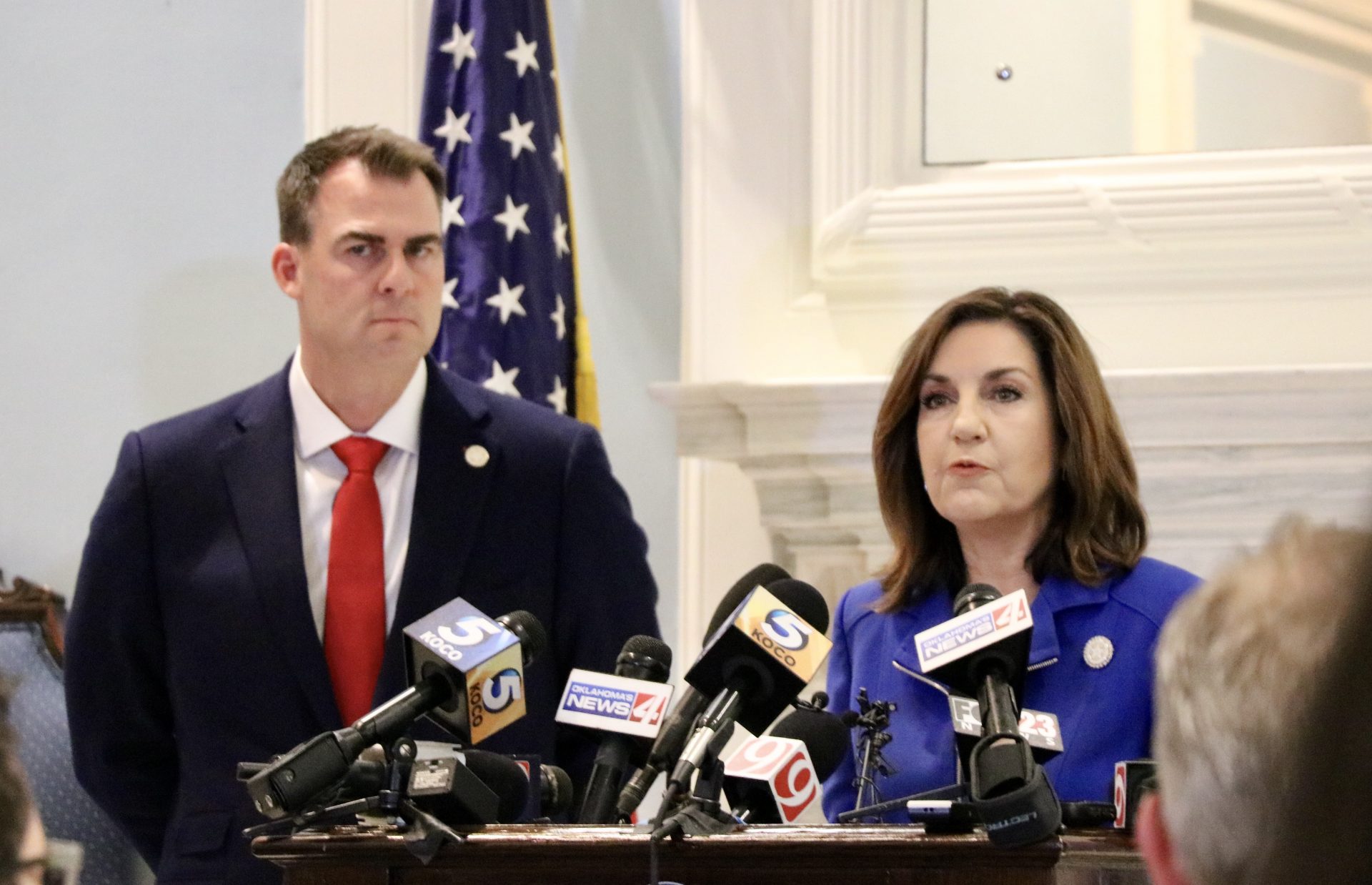
Oklahoma Gov. Kevin Stitt and State Superintendent of Public Instruction Joy Hofmeister address the media during a press conference March 12, 2020 about COVID-19 and the potential for school closures.
Robby Korth / StateImpact Oklahoma


Oklahoma Gov. Kevin Stitt and State Superintendent of Public Instruction Joy Hofmeister address the media during a press conference March 12, 2020 about COVID-19 and the potential for school closures.
Robby Korth / StateImpact Oklahoma
Before they were political foes, Gov. Kevin Stitt and State Superintendent Joy Hofmeister were united.
In 2020, when both were Republicans, the pair stressed the need to be vigilant in schools. This was mere hours after COVID-19 had infamously shut down an NBA basketball game in downtown Oklahoma City.
“We are working with our schools all across our state to evaluate the developing situation on a day by day basis,” Stitt said at a press conference following the game.
“Thank you, Governor,” Hofmeister said. “Nothing is more important than the safety and well-being of our students and their families and those who work in schools to serve them.”
Before the COVID-19 pandemic, the pair had been more or less aligned.
But things have changed.
They broke off on policies related particularly to masks and keeping schools open amid skyrocketing case counts. Hofmeister changed parties and became a Democrat.
Today the pair are squaring off in a race for governor, and it appears to be a close one. Hofmeister is polling just one point behind the incumbent Republican governor per a recent nonpartisan report by Sooner Poll.
“What we’re seeing this year is that while Kevin Stitt is getting about 70% of Republicans, he’s losing 15%,” said Bill Shapard, Sooner Poll’s founder.
And the poll was surprisingly close in deep red Oklahoma. While Hofmeister has won over many in her new party, Shapard says Stitt seems to be losing more Republicans to his challenger.
“So kind of why is that?” Shapard said. “Is it because they kind of see her as a Republican and they liked her as a Republican and they’re willing to kind of stick with her a little bit? Maybe they have some sort of beef with Governor Stitt over education or something else.”
Education is normally relegated to the back burner in political races – especially in national races – said OU political scientist and education policy expert Deven Carlson.
“Education policy can enter into those gubernatorial races because education is ultimately a state level issue,” he said.
Education is a sharp dividing line between Hofmeister and Stitt. The governor has made it clear he is all in on vouchers and school choice, while the state superintendent says those kinds of policies would hurt traditional public schools. That’s become a common dichotomy in races across the country.
“Historically, you know, public education was really kind of supported by both parties,” Carlson said. “And over time, education has become a more partisan issue where public education and the attendant interests are associated with the Democratic Party, and school choice is more generally associated with the Republican Party.”
But school choice also faces a good deal of opposition within the GOP. It’s especially unpopular with rural Republicans.
Ultimately, education policy changes come down to money. And no matter who wins, advancing their goals will be highly dependent on what the legislature is or isn’t willing to do.
In the last session, lawmakers kept public education funding flat and also failed to pass a major private K-12 scholarship bill. At the same time, they put billions of dollars into rainy day funds.
“Since the teacher walkout and the subsequent legislation that did address a number of the asks from the public education community, we haven’t seen a whole lot happen at the state level with respect to education, and I kind of see that continuing for the next several years,” Carlson said.
The race is tightening. Sooner Poll and Amber Integrated have both come out with polls showing a narrow lead for the incumbent governor in a deep red state. Education could be playing a role, especially in driving pro-public school voters toward Hofmeister, who had a presence at the 2018 walkout as state superintendent.
Abortion. Inflation. Education. All those issues will combine to motivate people to the polls. But how much the issues ultimately move the needle in Oklahoma remains unclear. Ultimately, voters will decide that on election day.
“Education is perhaps more relevant in this race than in many,” Carlson said. “But it’s still far from the only issue that voters are going to think about or care about when they cast their ballot.”